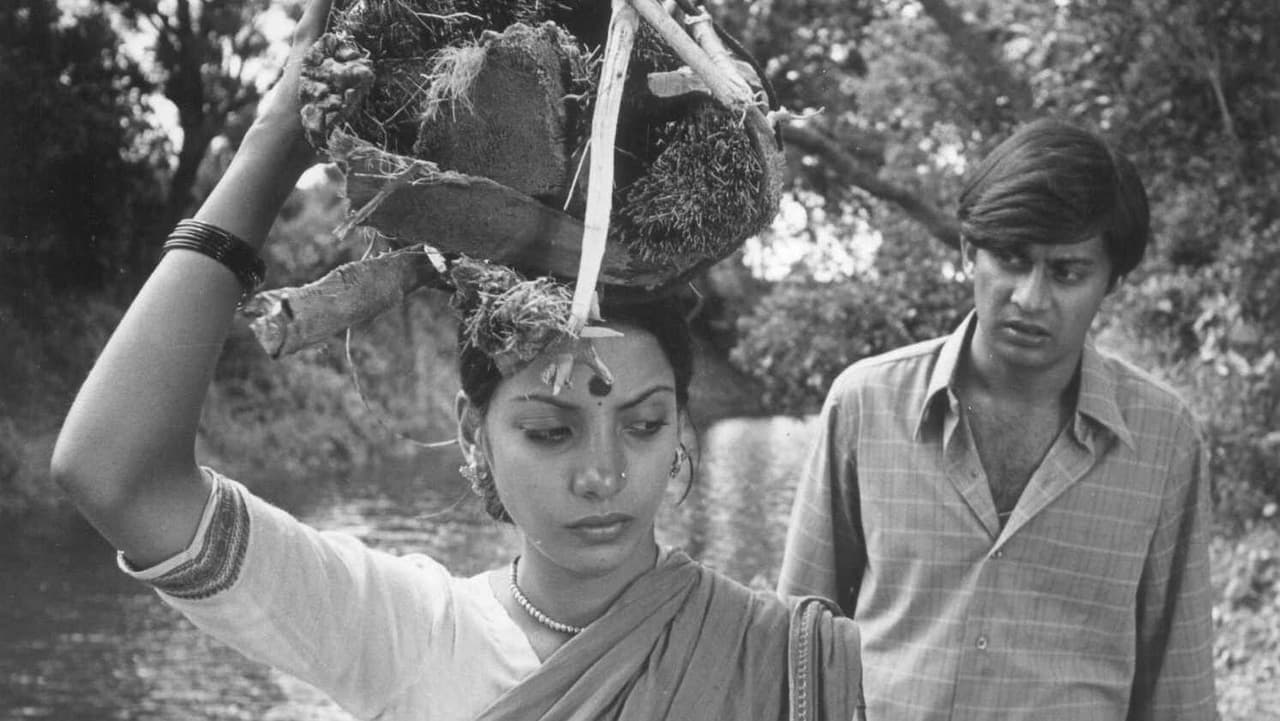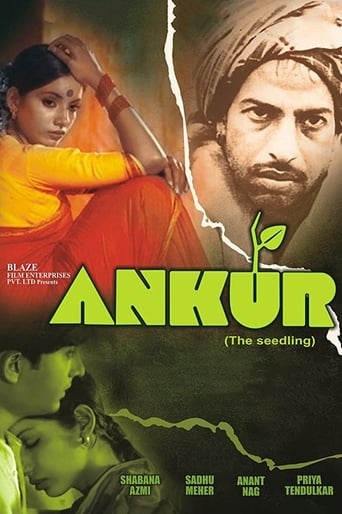

Ankur means the Seedling. And indeed, this film was a seed to the parallel movement in films that ran in 70's and 80's. It's a wonderful depiction of the reality which existed then, and even today in some remote parts of India. The narrative is simple and indeed very slow, there are no major subplots as the main plot in itself is heart rending and superior to many films that have come till then. In an age, where superstars were being made, and Amitabh Bachhan was transformed as Angry Young Man, this film silently made its way into the public with a limited released and later on with the word of mouth. All because of many good traits that the film possesses.Shyam Benegal, who is now considered as a father of Parallel Cinema, wrote this long back and had to go to struggle to a lot to get this made. All this was done with a meager budget and the product that was obtained out of the hard work is a stand-out even today. Ankur is a pioneer and has it's moments of greatness considering the time, it was made. Subsequently, even Shyam Benegal was revered as a great film maker as many more wonderful films came from him.Now, today when I saw it, it felt a bit anachronistic and antiquated coz I do not see such kind of vulgar oppression anywhere now, may be there is but it's not reported or it's not there any more. Having said that, the emotions are universal and the feeling of being oppressed, the helplessness, the hopes that are there for well being and then a revolution being sparked. All this is put wonderfully. The last shot where a boy throws a stone at the Zamindar's house is of great symbolism and portrays a feeling that echoes with the poor who keep the poor as poor. The acting was superb, Shabana Azmi was a revelation and a blessed actor and we were grateful to have firstly and also grateful for makers to give her ample opportunities that helped her showcase her talent with an array of emotions. Thanks to Benegal to have found her and given Shabana to us. It needs applause in many areas, firstly for starting a kind of cinematic revolution in India. Yet, my only crib is the editing, I wish the film could have been slicker with sharp editing. It would have added to the pace and helped the new-age viewers like me. I am going with 4/5. It's a kind of film that's strong in social issues. But it's a laid back film that makes us recede in time. So just be warned of the pace coz it's a great film.
... View MoreThe film, based on a short story by the director himself, was shot in a village somewhere near Hyderabad in Andhra Pradesh. The protagonist speaks in a 'Dakhini dialect' close to Hindi, which in the words of Shyam Benegal, was chosen to have a wider appeal across the country. The tale of exploitation of the poorer section of society by the rich landlords is seen through the predicament of Lakshmi (Shabana Azmi), a maid who falls into a trap of an illegitimate relationship with the young landlord (Anant Nag) when her husband (Sadhu Meher) forsakes her for a while and goes off elsewhere to escape the humiliation he was meted out by Anant Nag for an innocuous act of petty stealing. The scene where Meher is shaved off his hair and paraded on a donkey across the village is a depiction of rural India much as it exists in reality. Shabana Azmi excels in the dramatic sequences towards the climax. The cinematography by Gobind Nihalani is excellent, and sequences such as rain pouring on a tin roof in village houses exude charm of the rural backdrop.Rating: 3.8 out of 5
... View MoreSurya (Anant Nag) reluctantly becomes the landlord of his father's fields, after his requests to continue further studies are rejected by his father. Surya's father wants him to be financially sound and socially secure, and so gets him married to a young Saroj. Saroj, still a kid, stays back at her house till she comes of age.Meanwhile, Surya stays in the village, where he acquaints Laxmi, the domestic help and her deaf-mute husband Kishtaya, who had been a potter once but was unemployed now. Surya sets things straight in the fields by cutting off the water supplies to his step-mother and step-brother and also ordering the local caretaker to find out who is behind the theft of the juice from the trees. Kishtaya, who is provided the job of taking the village kids to school, turns out to be the culprit and is publicly flayed. He leaves the village without informing anyone, and his wife, Laxmi is left alone with Surya. Surya, being sexually frustrated, makes advances to her and she at last succumbs. Things turn out for the worse when she gets pregnant with his baby and Surya's wife comes to the village to stay with him.Shabana Azmi is a fine and consistent actress and here too she brings temperance to her performance. The scene of compunction is performed with great sincerity and humanness. The same scene could've been ruined with pretentious overacting but under Shyam Benegal's guidance, everything at least looks real. The supporting cast also put truthfulness in their performances, something that I prefer. Usually, I do not like sappiness and I find it a lot in Indian films.The background is verdant and glowing; my favorite color green is frequently seen in the form of grass and trees. Shyam Benegal's direction is cogent, and there are many scenes which touch upon a number of issues prevalent in those times and even now, especially the disturbing attitude of villagers towards caste and the position of women.The movie lacks in completeness, however. One can see a feministic approach Benegal has given here, since Shabana takes up quite a lot of screen time and is also given a mind of her own. But I felt that unfair justice was given to the story in its entirety, mainly because of the excessive focus on Priya Tendulkar's character rather than Shabana's towards the end. It would've been better to keep the direct focus on Anant Nag and Azmi and their characters' behavior towards each other with the coming of Priya's character, who should've got indirect focus. Also, the film does not consider Surya's father's character at the end and ends abruptly with all the blame being put at Surya. I, as a viewer, wanted an ending that was satisfactory for all the characters, as I felt Surya here was not a villain, but just a coward. An example of a perfect climax and catharsis would be 'The Passage to India', which is longer yet more satisfying.Ankur to me is a good film, better than most Indian films today, but not at par with my other Hindi favorites, Pyaasa and Kora Kaagaz ( the Jaya Bachchan movie).My Rating: 6.5/10
... View MoreThis is one of the first Hindi movies of the art movie genre. This movie was released when bollywood was undergoing a sort of writer's block. At the same time the alternative cinema was in a creative ferment. This movie is truly a work of genius directorial talent. The characters of this movie are so real and their psychology is shown in a unique way. The acting in this movie is just great. The director's deep knowledge of the human psyche is reflected in this movie. The hypocrisy and innocence of human nature is so beautifully pictured. The camera work is great. The viewer could get a glimpse into the rural India as it is without any makeover or idyllic transformation. This movie doesn't tell a story ; rather the actors as well as the viewers live the story. So engrossing is this movie.A treat to the eyes.
... View More